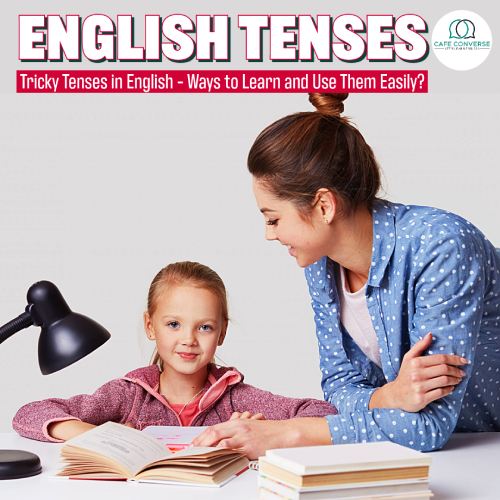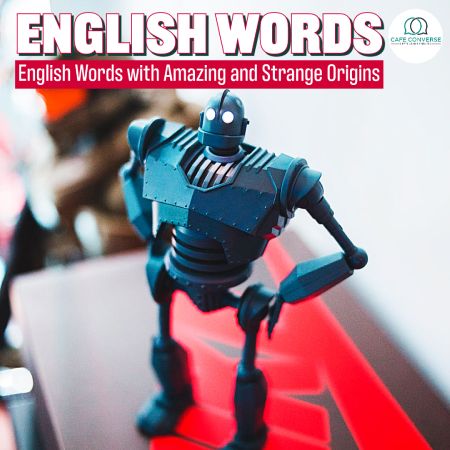Whether you’re an English teacher striving for perfection or a budding writer, understanding tenses can be tricky. Tenses in English show when actions occur in a sentence and influence the meaning of a sentence. Let’s learn the tricks of learning and using English tenses easily from Cafe Converse, which offers Delhi’s most sorted English tuition and coaching classes.
What are the types of English tenses?
Let us know what are the types of tenses given below:
Simple Tenses
Simple Present describes general truths, habits, or regular actions. Eg: Sapna goes to school daily.
Simple Past: Used to describe completed actions or events in the past. Eg: Sapna went to play football yesterday.
Simple Future: Used to express actions or states that will occur in the future. Eg: Sapna will visit her grandparents tomorrow.
Continuous Tenses
Present Continuous: Describes actions that are happening at the moment of speaking. Eg: Sapna is singing.
Past Continuous: Describes actions that were ongoing in the past. Eg: Sapna was singing.
Future Continuous: Describes actions that will be ongoing in the future.Eg: Sapna will be singing.
Perfect Tenses:
Present Perfect: Indicates actions that occurred indefinitely before the present. Eg: She has travelled to many countries.
Past Perfect: Describes an action that was completed before another past action. Eg: She had to travel to many countries.
Future Perfect: Indicates an action that will be completed before a specified point in the future. Eg: By next year, she will have travelled to many countries.
Perfect Continuous Tense
Present Perfect Continuous: Describes actions that started in the past, continue into the present, and may continue into the future. Eg: They have been working on the project for two hours.
Past Perfect Continuous: Describes actions that were ongoing for a period of time before another action in the past. Eg: He had been waiting for hours before the bus finally arrived.
Future Perfect Continuous: Describes actions that will be ongoing for a period of time before a specified point in the future. Example: By this time next week, they will have been living here for a year.
Now, that you have learned about the types of tenses, let’s move on to the next step.
What are the easy learning tips?
Ms. Sonu Goel, Founder of Cafe Converse shares some easy learning tips to master them:
- Pay attention to a single time frame
Focus on a single time frame, like the present. Choose either simple, continuous, or perfect tenses. Avoid mixing past, present, and future tenses initially, as sticking to one helps students understand better. For instance, focus on “I play” (simple), “I am playing” (continuous), or “I have played” (perfect). This method assumes students find it easier to follow when staying within a single time frame. It’s akin to telling a story, where you typically stick to a single time frame throughout.
- Explore more about that single time frame already chosen by you
Let’s break down the tenses within the specified time frame in relation to each other. Try and differentiate between “play,” “am playing,” and “have played.” Each of these conveys information about an activity that continues to be relevant in the present, yet they offer unique perspectives.
For instance, the simple present tense, as in “play,” represents a habitual or regular activity across time whereas, the present continuous tense, “am playing,” indicates an action occurring in the current moment. Meanwhile, the present perfect tense, as in “have played,” suggests a past action relevant to the present.
- Regular Review while moving on to the next two time frames
Keep revising the previous one as you transition from one time frame to the next. This iterative process serves to strengthen the interconnectedness across the various temporal dimensions. For example. when exploring future tenses like “will eat” and “will have eaten,” link them back to present tenses like “eat” and “have eaten.”
- Practise Daily
Like any skill, learning English tenses requires consistent practice. Practice speaking to yourself first, then write them down in a diary, and do this exercise daily. Gradually you will gain the confidence to speak in public.
Nothing happens overnight. Stay committed, stay curious, and watch as your command of English tenses improves over time.

Ms Sonu Goel is a professionally acclaimed certified ESL trainer from the British Council having 15 years of strong background for teaching the English language in both online and physical classes. She is dedicated to teaching of English in an interactive and practical way, whereby learners feel enriched with knowledge and experience the language hands-on. She uses creative ideas and aids to let the learning happen as organically and efficiently as possible. Ms Goel has travelled to various European countries and experienced an array of cultures and linguistic skills for the English language.
To learn more about Sonu Goel please visit : https://cafeconverse.com/best-english-tutor-coach-teacher-sonu-goel.html



